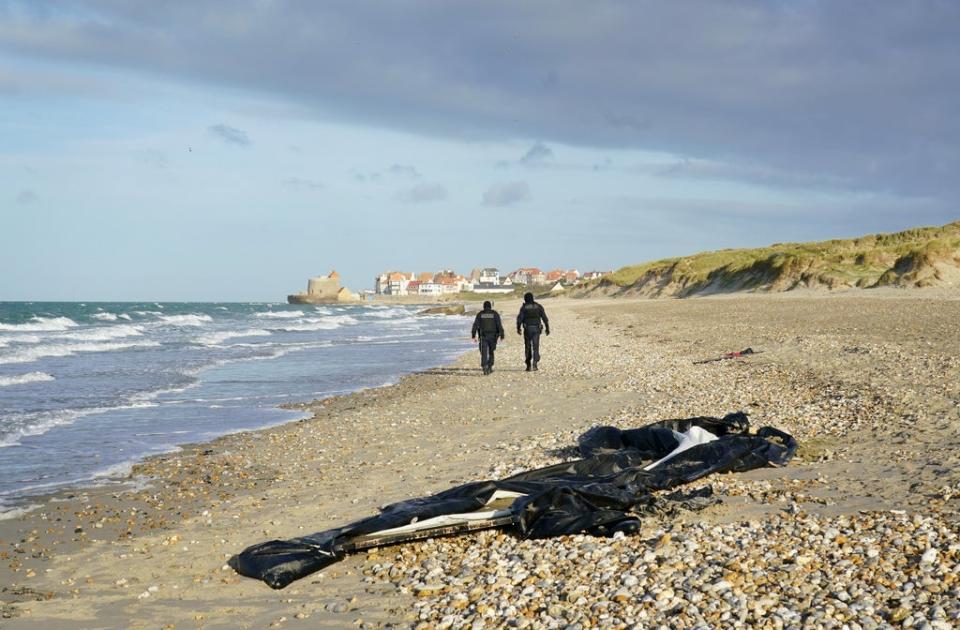Home Office vows to proceed with migrant pushbacks after boat tragedy – but won’t say if they’ve started
The government has vowed to press ahead with plans to force migrant boats back to France after the English Channel’s deadliest disaster, but is refusing to say whether any pushbacks have happened.
Ministers have repeatedly said that the operations have been “authorised” and claimed they are “safe and legal”, despite concerns raised by the UN Refugee Agency and others.
But Home Office officials have refused to confirm if any pushbacks have yet taken place, claiming that they cannot comment for “operational reasons and to avoid giving an advantage to the serious organised criminal groups facilitating these crossings”.
Unions representing Border Force staff have told The Independent they are unaware of any pushbacks happening since the tactic was announced two months ago.
During a debate in parliament following the deaths of at least 27 people in a dinghy sinking, an MP said the disaster should result in the plans being dropped.
Scottish National Party MP Martyn Day asked Priti Patel to “commit to ending all discussion of the UK using dangerous and life-threatening pushback tactics in the Channel”.
The home secretary did not directly address the question and responded by saying she was “disappointed by the honourable gentleman’s tone and comments”.
Home Office minister Tom Pursglove refused to answer questions on whether the powers had yet been used, while appearing on BBC Newsnight.
He said maritime commanders would make operational decisions “in the event of these tactics being deployed”.
“Ministers have signed off those operating procedures and we believe they are safe and legal,” Mr Pursglove added. “I think it is right that the UK has a maritime deterrent.”
Three potential legal challenges are already being mounted over the plans, and complex rules imposed by the Home Office to prevent violations of international law have raised questions over whether pushbacks will ever go ahead.
The legal challenges, which are in an early stage, argue that the operations would be unlawful on several grounds.
Care4Calais is seeking for policy documents to be published so they can be properly scrutinised.

Founder Clare Moseley told The Independent: “This is an important policy that affects people’s lives; people could die as a result of it.”
She said the home secretary’s arguments that forcing boats back to France would not endanger migrants, and would ultimately save lives by deterring crossings, “don’t stand up to reasonable scrutiny”.
The Channel Rescue charity is crowdfunding for a separate legal challenge based on maritime law, and said it wanted to “ensure that this inhumane and life-threatening policy is never approved or put into action”.
A third legal challenge, by the Freedom From Torture group, contends that the pushback policy has no legal basis, authorises unlawful conduct by UK officials and is forbidden by the UN Refugee Convention.
It has written to Ms Patel asking her to withdraw the policy and to confirm that it will not be implemented, and will apply for a judicial review if “no satisfactory response is received”.
It’s scandalous that we have to challenge it in the courts, because the moral compass of this government is so lost at sea
Sonya Sceats, chief executive of Freedom from Torture
Sonya Sceats, chief executive of Freedom from Torture, said: “Boris Johnson’s cruel plan to ‘push back’ refugee dinghies will only lead to more people dying in the Channel.
“We believe this is not only morally indefensible, but also against the law. It’s scandalous that we have to challenge it in the courts, because the moral compass of this government is so lost at sea.
“The tragic deaths this week should be a wake-up call. We need to take every step we can to avoid more loss of life and fight for a better approach to supporting refugees that is more humane, fair and effective.”
A suite of new laws proposed by the government would criminalise small boat crossings by making it an offence to enter the UK without official permission.
The Nationality and Borders Bill would also create partial legal immunity for Border Force officials in the event that pushbacks cause migrants to drown.
While being questioned on the move by a parliamentary committee last month, the home secretary said the government would “never do anything to put the safety of people’s lives at risk”.
“We’re not here to threaten lives, we’re here to save lives and make sure that people’s lives are not put at risk [with Channel crossings],” she added.
But a UN Refugee Agency (UNHCR) official said pushbacks in the English Channel would “unavoidably” put lives at risk and may not work as a deterrent.
The UNHCR’s UK representative Rossella Pagliuchi-Lor said: “There is an obligation to both save lives at sea and not endanger lives at sea, which would almost unavoidably happen if there were attempts at turning back dinghies which are overcrowded with people.”
The Independent understands that under current rules any pushback operations would have to meet numerous conditions, including the presence of French authorities to receive vessels.
But France has suggested it will not cooperate with the plans, with a letter to Ms Patel from her counterpart earlier this year saying the “use of maritime refoulements to French territorial waters would risk having a negative impact on our cooperation”.
Read More
‘We have to go, even if we die’: Refugees in France still determined to cross Channel despite risks
Migrant tragedy: What do we know about the people who died in the Channel?
Channel crossings: Authorities grappling with ‘cellular structure’ of people smugglers across Europe
Will the migrant boat disaster force the government to change its approach to Channel crossings?
French fishermen block ports in spat with UK

